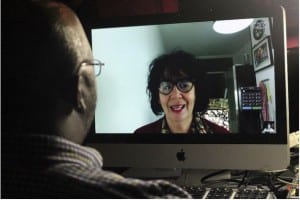 Online interviews are peculiar beasts. They’re a strange quirk of the modern world, but increasingly people find them becoming a part of their job search. Usually employers use Skype, although they might occasionally use different software. There are lots of things you have to consider with an online interview that you don’t have to think about when you meet someone in person. Even once you’re past all the technical hurdles, there are ways that you need to adjust your interview technique to come across better over a webcam. Some people prefer video interviews while others would like to avoid them altogether. But whether you love them or hate them, they could be on the increase. You’ll probably end up doing one eventually, so why not prepare yourself ahead of time? Frank Mixson
Online interviews are peculiar beasts. They’re a strange quirk of the modern world, but increasingly people find them becoming a part of their job search. Usually employers use Skype, although they might occasionally use different software. There are lots of things you have to consider with an online interview that you don’t have to think about when you meet someone in person. Even once you’re past all the technical hurdles, there are ways that you need to adjust your interview technique to come across better over a webcam. Some people prefer video interviews while others would like to avoid them altogether. But whether you love them or hate them, they could be on the increase. You’ll probably end up doing one eventually, so why not prepare yourself ahead of time? Frank Mixson
Dress Appropriately
Once you’ve tested your kit, including your connection, camera, and microphone, it’s time to take care of yourself. Just because you’ll be interviewing via a webcam, it doesn’t mean that you shouldn’t dress appropriately. You might be at home, but you’re still taking part in a professional interview. Many people are tempted only to smarten up on top and to go more relaxed below, for example by wearing a suit jacket and pajama bottoms. But you should dress professionally from head to toe. For one thing, you might need to stand up during the interview. But it will also make you feel more prepared and put you in the right mindset.
Eye Contact and Body Language
Eye contact and body language are important in interviews. But it’s a little strange if you’re sitting in a room in New York, interviewing for the position of a criminal solicitor in London. You’re not even in the same country as your interviewer, let alone the same room. Many people make the mistake of looking at their screen and into the interviewer’s eyes. But while this might feel natural, from the other end it will feel like you’re looking away. What you need to do is look straight into your camera, so you’re looking forward on the interviewer’s screen. It may feel strange, but you’ll soon get used to it.
Body language can be a complicated thing to puzzle out too. Try to avoid compensating for not being in the same room by making bigger gestures or movements. It might be best to minimize your hand movements, but try to keep your body language open.
Take Advantage of the Distance
Being separated from your interviewer has its good points. Although it’s inadvisable to dress casually, you can take the opportunity to use more notes. You should still do plenty of preparation, but you can ensure you don’t forget anything. Use sticky notes to jot down a few prompts to answers or questions you have for the interviewer. Stick them to the top or corner of your screen, so you don’t have to look away to read them, and you can still see your interviewer. You shouldn’t rely on them too heavily, but they can help as a reminder if you’re nervous, even if you don’t end up using them.
